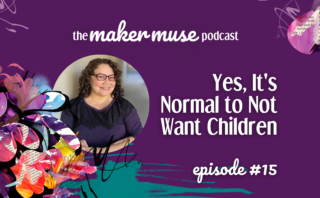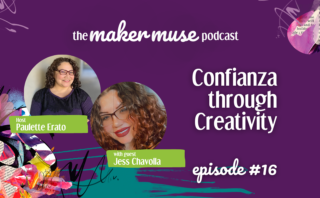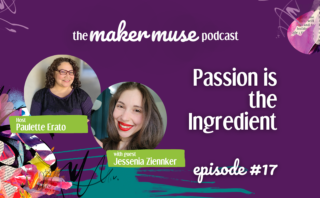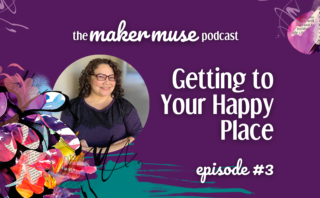We all have stories about who we are that we hang onto long past their expiration date. Sometimes those stories started off true, but they might not be anymore. That’s when they get in our way and can hamper our creative flow. What old stories are you clinging to about yourself?
Are you actually storytelling or short changing yourself?
I’ll give you a few examples from my own storyline, and we’ll dive into how you can change your own, so you can stop telling lies about yourself.
Scroll down for a full episode transcript.
This post may contain affiliate links. For more information, please see my Disclosure Policy.*
In this episode:
Socialize online
Subscribe to the mailing list and follow The Maker Muse on:
Transcript
0:00
Hola and welcome to The Maker Muse Podcast. I’m Paulette Erato, the Maker Muse. I hope you’re staying hydrated today. If I haven’t mentioned it before, forgive me, disculpa me. That’s like the number one rule of being in the maker mindset. Hydration is good for your body. It’s good for your brain. It’s good for your creative flow, which is what we’re trying to get into here.
0:20
So today let’s talk about what might be blocking that flow. It could be we’re locked into some stories about ourselves that simply aren’t true. In fact, they’ve become lies we tell ourselves and about ourselves. You might have some. I’m going to share with you a few of mine and how they’ve played out over the years and also why some are really hard to change.
0:44
Before we jump into it, here’s what I hope you get out of this episode. One is we all have a story to tell and sometimes those stories are borne out of comfort. Two just because you’ve always told A story about yourself, doesn’t mean it has to be THE story about you. Finally three: if a story is no longer true about you, you have the power to simply drop it.
1:12
So, what do these stories sound like? We all have an origin story, right? And those autobiographies are peppered with little details about what makes us, us. But sometimes we get so used to saying stuff about ourselves, or we heard the same description of ourselves growing up that these little anecdotes become how we describe ourselves.
1:35
They sound like things we just say automatically. And even if they’re not true, they tend to come out of our mouths without us thinking. Here are a few examples. Like, I hate fish. Or maybe you say I’m a night person, but then you’re always tired. Or maybe you think that you’re not good at plants because you always kill them.
1:57
Or, and here’s a common one: I hate people. All of these things, I used to say about myself or I would tell other people about me. I hate fish. I’m a night person. I’m not good at plants. And I’m not a people person.
2:14
And then I realized that none of that is true and yet they were so easy to say. Why were they so easy to just blurt out? Because they’ve become like this automatic response for us. They become so deeply ingrained in the story of you and your idea of you, that it’s very hard to let go of them. Even if you have ample evidence that it’s not true.
2:40
Let’s talk about what that evidence looks like. Let’s take the eating fish example. I actually love fish, which right now for me is very weird to say, but it’s true. Especially sushi, especially poke bowls. And I love scallops, especially when they’re wrapped in bacon. And I love ceviche, so mostly, you know, raw fish. Although, you know, not scallops or bacon raw. That’s a lot of evidence. And in this house we eat sushi like almost once a week.
3:10
That’s a lot of proof that the phrase “I hate fish” is just not true. And you know how your brain loves proof, right? And yet that one for me in particular was very hard to let go of, because I think it’s because I keep hearkening back to my childhood.
3:27
We ate a lot of salmon when I was younger. And it must have been really inexpensive because we were not rich people. And I hated it. I hated it so, so badly. So the more correct phrase is ‘I hate salmon.” But not even all salmon, because I love lox on my bagel. I love salmon sushi . What I hate is baked salmon. I really, really, really, really hate it. And also fish with skin on it.
3:55
But those are two very specific ways of serving fish that do not apply in all situations.
4:04
So there were many instances I can point to where the phrase “I hate fish” is a complete and utter lie. And yet it’s so hard for me to let go of, even as I’m talking to you right now, I still feel weird saying no, I love fish.
4:19
It’s something I felt so deeply as a child that it’s, it’s stuck with me now for over 40 years, this vibration, this idea, this wiring in my brain, is very tough to let go of . So I get it. I get it. If you feel there are certain stories about yourself that are very hard to rewrite. The point is you have to rewrite your story periodically because you go through cycles of change in your life.
4:47
Here’s another one. For the longest time I thought I had a black thumb. Don’t give me plants because they will die in my possession. My husband and I we’re both bad at plants. We managed to kill both bamboo and cactus. Cactus! We live in an urban desert. These plants have survived millions of years here, but once they came into my home, they just kind of… gave up.
5:10
But this was one I was determined to change. This was a story I didn’t want to have anymore. Not about me and not about us. Especially during lockdown as I was watching people online get really into plants. I wanted to do that too. So, how did I change this story about myself? It actually started with some oregano brujo, or Mexican mint to some of you.
5:33
It’s a hardy plant that survives pretty well on neglect. We had this from the beginning of our relationship, when we moved in together, that was like in 2014. So that’s now eight years of proof that I don’t kill all the plants, right?
5:48
Well earlier this year, I bought some basil from Trader Joe’s. You know those little window sill plants that they have when you walk into the store? If you’re not familiar with Trader Joe’s, then you probably have this at your supermarket too.
5:59
Anyway, I was tired of buying a whole box of basil when all I needed was just a little bit and then the rest would die. So I decided to see if I could just keep one alive for a little while and just take the little bit that I needed here and there.
6:12
Now here’s something I didn’t know about basil: they are high maintenance little princesses. They need a lot of light, but not too much light, and they need to be watered multiple times a week. And mine did not like being outside in the direct sunlight on the balcony because even winter in LA is a little too cold for them. Telling you, high maintenance.
6:31
So it started to wilt on me after just a few days. And I was like, chingao she is not going to get the best of me (because of course she’s a she). So I did the research and realized she needed to be put inside on a window sill, but watered every three to four days. And guess what?
6:46
That wilty little brat sprang right back up. I brought her back from the brink of death. I felt like I had finally unlocked the secret to plants. And I’m not going to lie. I felt a little bit like a superhero. Me who’d always been bad at plants. Or so goes this story I was incorrectly telling about myself.
7:08
I was keeping a bitchy little plant alive and happy. That thing is still going. That’s when the flood gates opened. Since then, we’ve added some snake plants, a Hoya carnosa. And they’re all nice and low maintenance, like the oregano brujo, which is perfect.
7:25
So we are now officially plant people. I made that happen. I managed to successfully rewrite that story. And this is something you can do too. Here’s another example. Let’s talk about being annoyed by people. This one is super common, cause we all get annoyed by people. They’re annoying. It’s very easy to lean into it and say, you hate people, right?
7:53
And, you know, I used to think that about myself too. Especially in my last job, where I was forced to manage situations with people who were very entitled. They had a lot of money and they never heard the word no. They also had these false narratives about themselves because they were born on third base, but they believed they had pulled themselves up by their bootstraps. And putting up with people like that can be soul crushing .
8:19
So I don’t hate people. I don’t hate them. I’ve known that for a long time, but it’s also just easy to say, because again, people are annoying. We would not have been locked down for as long as we had if people had all just followed the rules, right? This was like the big global group project that 20% of us did the work on, 80% slacked, and we all got F’s, right?
8:42
Well, a few weeks ago, I went out for the first time in years. Actually, it was longer than lockdown because I hadn’t been to a convention, I hadn’t been involved in a convention, since 2018, because that’s actually what I used to do for a living. And I hadn’t been to one that I didn’t plan in or was at least in some way involved in for… god knows how long I’ve been a meeting planner since 2005. So to attend something that I wasn’t at least marginally involved in, or it was like involved to my industry, was a very weird experience. It was even held in a hotel that I have had a big conference in.
9:19
¡Ay Dios mio!
9:21
But anyway, it was so much fun! So much fun because my idea of fun is walking up to a group of strangers and making them my friends. I know I’m weird, but I love that about myself. I usually do not get nervous talking to strangers. It’s one of my favorite things about my last job, because here’s a little aside.
9:38
I used to have to fly around a lot and before I’d get on my flights, you know, I’d get to the airport early. I’d go and I’d have a beer at the airport bar. And every single airport bar across the United States has Blue Moon on tap. So I knew I could go and enjoy at least a Blue Moon, not the greatest beer, not the worst. And then there would be someone there to talk to, to make conversation with. That was the great unknown. Who was I going to get to talk to this time? And that is my idea of fun because I’m a hyper extrovert. And I know that is true.
10:08
So my first day back out in the world of people. The first day of this event, I was a little nervous because again, it was first time out of the pandemic for me, first time in a big crowd of people and in an arena (was podcasting conference), that’s completely new to me, right?
10:24
So this, this podcast is, is completely new. It’s a new business, it’s a new idea, and I’m learning as I go. At the time, I was four episodes in and I was, I was really feeling those newbie vibes, which is natural, right? I was brand new to this thing that everyone else seemed to have a lot more experience in, so I felt like a tiny fish in a big pond. And so that made me a little nervous and shy. Which is was a very weird feeling. But luckily I had connected with someone before getting there, so we met up right away and I let go of that.
11:00
So then I came home at the end of that day and was like exploding on my husband with excitement about all the stuff I learned and all the people I talked to. The second day was much worse for him because I came home very late. There was an after party and all this stuff. And I was still so excited and full of energy when I came home. And then as soon as I let it all out, I just flopped on the bed and went to sleep.
11:25
I joke around that I’m an energy vampire because I actually like to absorb energy from people. It like makes me even better than how I normally am because I feed on other people’s energy. I don’t deplete them though. I’m not an actual vampire.
11:40
But I gained so much more empowerment and energy from just being around people. So I can’t hate people for offering me that, right? I can hate entitled people. I can hate stupid people, but like, the hate, the act of hate actually takes a lot of active energy. And I, I don’t have time for that.
11:58
So I don’t actually hate people. It’s just an automatic response I’ve had. You might feel this way too. It’s just an automatic response. You can dislike certain people. It’s just been repeated so often it’s kind of now hardwired into our brains because it’s something people say all the time. And it’s not really true.
12:22
So I want you to examine what you’ve been saying about yourself in the same kind of way. It doesn’t even have to be, “I’m not an artist,” although this can lead there. What are some things you’ve been saying about yourself? Maybe you say you hate fish or you hate people. But you can start with the more innocuous ones. Like if you also say that you’re a night owl, when in actuality you like getting up early.
12:47
Maybe you actually like going to sleep earlier and waking up earlier. Because you’re actually a morning person. And yet you’re still saying you’re a night owl just because that’s how you operated back in college or in your twenties. That doesn’t make it still true. And so you can change that story.
13:05
Look at what you say about yourself and examine whether or not it’s true. Is it, is it actually true? And if it’s not ask yourself, why do you keep saying it? Why do you even keep thinking it? Why does your inner critic keeps saying it to you?
13:20
You can do this with almost anything you believe to be true. Are you actually not talented at, you know, X thing? Or did someone once tell you that, and you believed it without question? Remember that almost everything is a learned skill. We talked about this in episode two, when we defined what an actual artist is as someone who’s skilled at a particular task or occupation.
13:44
But how did they learn those skills? Practice. So even if you are bad at The Thing, whatever it is you were told not to do or stay away from because you weren’t any good at it, guess what? You GET to be bad at it. You can be bad at it while you’re learning to do it better. You get to be bad at it!
14:04
You get to be bad at it! You’ve heard me say it over and over. So, go be bad at something while you’re learning the skills to become good at it. So, yeah. Re-examine your stories and figure out what is true, what you want to be true, and what you’re just tired of saying anymore.
14:26
So to recap: sometimes we tell stories about ourselves that aren’t true because they’re easy and comfortable. Two you should examine your stories pretty regularly and see if they’re still accurate. Or did they become lies? And finally, number three. You are allowed to change your story. And in fact probably should.
14:49
Okay, maker friends. That’s where I’m going to leave this. Stay hydrated! And that’s a burrito! Thanks for listening to The Maker Muse Podcast. I’d love if we could make this a regular thing for you and me, so please subscribe to the podcast and tell all of your family and friends about it. And I’d really appreciate it if you could rate and review it wherever you’re listening to this right now. ¡Nos vemos!




